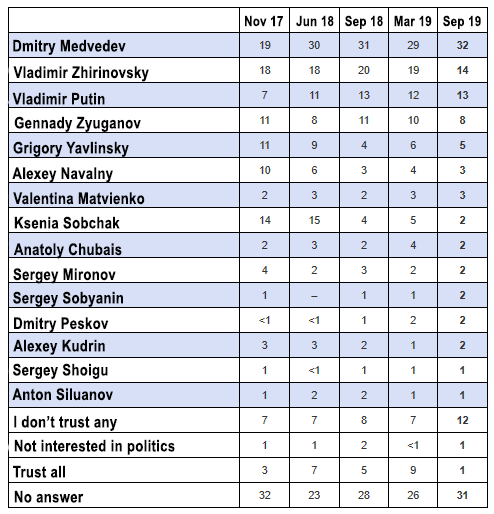

by John Helmer, Moscow
@bears_with
Heir apparent, or accounting app.
In the politics of the Russian succession, Alexei Kudrin, 59 years of age, has two distinctions. The first is that he is hated by the General Staff, Igor Sechin, and a large number of Russian voters. The second is that he is loved by the US Government, the international banks, the Russian oligarchs, and President Vladimir Putin. He failed once, nine years ago, to replace Dmitry Medvedev as prime minister; Medvedev sacked him. He failed again, in May 2018, to become Putin’s vice president; Putin nominated him to be chairman of the state auditor, the Accounting Chamber, when his parliamentary vote of approval was the lowest ever. Kudrin is trying again, and Moscow sources believe Putin is already advancing him. How far will the two of them get?
Recently, Kudrin has been meeting officially with the President more often than is normal. This has led to speculation in Moscow that Putin is promoting him behind Prime Minister Mikhail Mishustin.

Key: 1=President Putin meeting with the Government, February 5, 2020 (Kudrin ringed): 2=meeting of January 21, 2020: 3=meeting of January 14, 2020: 4=meeting of December 11, 2019.
On December 11, 2019, Kudrin told Putin: “Cumulatively, all the National Projects were executed 67 percent as of November 1, while progress on some of them was less than 20 percent by that time…It is difficult to say now how much of the government allocations will be pending at the end of the year. Maybe more than 100 billion rubles will be unused. Maybe even 200. In federal budget terms, we expect non-execution of federal spending at about 1 trillion rubles. This, of course, is something that never happened before. Last year, it was 770 billion.” Putin replied: “I have to say this really is a bit too much.” This was a declaration of war against the Medvedev Government and his ministers. Kudrin was placing himself in charge of the economic stimulus scheme on which the sanctioned oligarchs now depend for their cash, and the presidential candidate in 2024 for a majority of the popular vote.
On January 14, Kudrin told Putin: “In the near future, we will continue to monitor Rosatom, Rosavtodor and RZD, and we will also set our sights on Rostec, Gazprom and Rosneftegaz. Our goal is to make state companies more efficient to the benefit of the national economy.” That’s a declaration of war against the three most powerful state companies and their chief executives – Sergei Chemezov of Rostec; Alexei Miller of Gazprom; and Igor Sechin of the Rosneft group. Their combination, Sechin in particular, have their own succession plans, and Kudrin is standing in their way.
Kudrin also told Putin at the same meeting: “Take such a big problem as the provision of housing to orphans. Today we need housing for the 170,000 orphans who are entitled to this. We proposed a solution and took it up with the Government, for the umpteenth time, and eventually we have formulated, together with the Government, a solution that can be implemented within a few years.” That was a cynical jab at the Medvedev Government – cynical because Kudrin, who was first deputy finance minister responsible for the 1998 treasury default and finance minister and deputy prime minister in charge of the 2008 crash, is the architect of Russian inequality and capital outflow. Orphan housing is his Potemkin village.
A week later on January 21, when there was nothing fresh to talk about except Medvedev’s sacking on January 15, this is what Putin told Kudrin, according to the Kremlin transcript: “You have mentioned strategy-related auditing. I believe that as a former government member who prepared documents that are comparable to the current national projects, and also in your current capacity, you are in a position to gauge the efficiency of the state in attaining its goals. I hope that with you as its head, the Accounts Chamber will operate in this spirit and will provide considerable assistance to the implementation of our national projects.”
“Alexei Kudrin: This is exactly what we intend to do. Vladimir Putin: Thank you.”
What this means is that Kudrin is being put in charge of the strategic project of state spending to guarantee the succession campaign, as Putin is planning it. That’s over the heads of the ministers, including Mishustin’s head. A kind of vice president but without the constitutional niceties.
When Kudrin appeared at the opposite end of the table from Putin and Mishustin at the government ministers’ meeting of February 5, Putin rubbed it in. “As a reminder,” Putin said, “our main task is to achieve steady growth in real salaries, wages and income and consistent improvement of living standards. The entire Government must focus on this goal. This should not be divided into financial-economic, social or sectoral blocs. This has to be collaborative work, a team effort aimed at the final result. It is necessary to concentrate our efforts on our economic, social and educational policies and on the development of the infrastructure. I would like to emphasise that it is necessary to upgrade the performance of the cabinet.”
The idea that politics isn’t about competing “sectoral blocs”, but “upgrad[ing] the performance of the cabinet” was another cynical jab at the departed Medvedev. It was also a reminder to the ministers sitting between Kudrin and Putin that the chief accountant is in charge of them as much as the data processor-cum-tax inspector on Putin’s right. The leading ministers who weren’t present to hear this message included Defence Minister Sergei Shoigu.
Kudrin’s spokesman at the Accounting Chamber explains that he takes his seat at the Government meeting according to the Constitution and the federal law on the Accounting Chamber. Articles 102 and 103 of the Constitution provide the State Duma and the Federation Council with the power to elect the chairman, deputy chairman, and the auditors of the Chamber.
The 2013 law on the chamber, amended a year later, says: “The Chairman of the Accounting Chamber cannot be a Deputy of the State Duma, a member of the Federation Council, or a member of the Government of the Russian Federation. In this case, The Chairman of the Accounting Chamber has the right to participate in meetings of the Federation Council and the State Duma, their committees and commissions, the Government of the Russian Federation, and the Presidium of the Government of the Russian Federation.”
Putin has been meeting monthly with the cabinet; and Kudrin has been visible at many of those meetings. Tatiana Golikova, his predecessor at the Chamber between 2013 and 2018, also exercised the right to the seat; she lacked Kudrin’s power and ambition.
Last October the Levada Centre of Moscow reported a national poll, asking voters to name the five or six politicians or public figures they distrust the most. In face to face interviews, the question was an open-ended one; the respondents volunteered their own nominations. Kudrin came 13th on the list:
RUSSIAN POLITICIANS, PUBLIC FIGURES VOTERS DISTRUST THE MOST

Source: https://www.levada.ru/











Leave a Reply